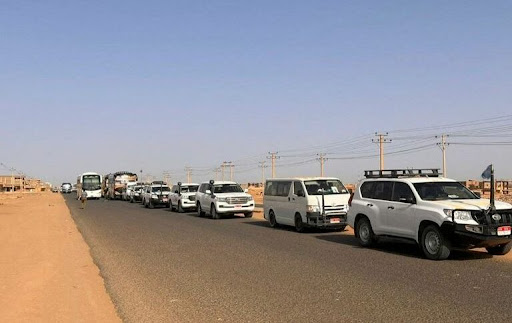Evacuation Of Nigerian Students From Sudan ‘To Begin Soon’
Following the agreement of a 3-day ceasefire in Sudan between the Rapid Support Forces (RSF) and Sudan Armed Forces (SAF), Nigerian authorities say evacuation of students and other nationals caught up by the war in Sudan will soon commence.

As they wait for buses that are promised to take them out of a war zone, Nigerian students, like every resident of Khartoum, are battling with scarcities of both food and water, power cuts and sporadic internet connectivity.
Officials say the rescue is on its way, but a planned mustering of the thousands of Nigerians who want to leave has already been aborted, and a precious day of the ceasefire window has almost passed.
“It’s now 4:35 pm and we are still in Sudan. One can see the disappointment and frustration in our faces,” one of the Nigerians trapped in Sudan told HumAngle.
Last week, HumAngle reported that thousands of Nigerian citizens studying in Sudan have been caught up in the crisis.
The Nigerian mission in Sudan plans to drive its citizens out of the embattled country by road, nearly 1,000kms to the border with Egypt.
Geofrey Onyeama, Nigeria’s foreign minister, stated over the weekend that he had been notified that 5,500 people, including students, employees, and others, had expressed their willingness for the evacuation.
Grace of God
The prospective evacuees told HumAngle that they were supposed to gather at two rendezvous points in the capital city at 6:00 am Tuesday April 25 to board buses to Egypt.
They later got a communication from the Nigerian embassy announcing the postponement of the process.
The mail did not state the time and date but said “people should endeavour to stay where they are in the interim. But we assure you we are going by the grace of God.”
The Nigerian Embassy in Sudan, in collaboration with the National Emergency Management Agency (NEMA), said it will begin the evacuation process of its citizens to Egypt by road, where they will be flown back to Nigeria.
“Even to find water is difficult. Since yesterday, I have been searching for drinking water, but I am yet to see it. I only drank a soft drink I was able to set my hands,” Jamil Sawwa-sawwa, a postgraduate student, told HumAgle.
“There is no food. We eat the junks people prepare with the remnants of their provisions,” he added.
Safe transit
The conflicting factions in Sudan have agreed to a 72-hour ceasefire, which began at midnight on April 25, following an intervention by the United States and Saudi Arabia.
Both the Rapid Support Forces (RSF) and Sudan Armed Forces (SAF) declared that they were prepared to assist in the evacuation of foreign nationals.
Nigerian students have, since the beginning of the crisis, started leaving the country to neighbouring countries like Egypt, Eritrea, Ethiopia, and Chad independently. Parents and relatives from Nigeria have been disturbed by this development.
However, Nigeria’s Ministry of Foreign Affairs, in a joint statement with the Ministry for Humanitarian Affairs, Disaster Management and Social Development on Monday, April 24, said, “concrete plans are underway, to deploy, very shortly, air transport to evacuate all stranded Nigerian citizens through the identified safe transit areas back home to Nigeria in safety and dignity.”
Access to healthcare has also been difficult since the beginning of the crisis, as it has resulted in the shutdown of over 70 per cent of healthcare facilities in the country’s capital.
Support Our Journalism
There are millions of ordinary people affected by conflict in Africa whose stories are missing in the mainstream media. HumAngle is determined to tell those challenging and under-reported stories, hoping that the people impacted by these conflicts will find the safety and security they deserve.
To ensure that we continue to provide public service coverage, we have a small favour to ask you. We want you to be part of our journalistic endeavour by contributing a token to us.
Your donation will further promote a robust, free, and independent media.
Donate HereStay Closer To The Stories That Matter




